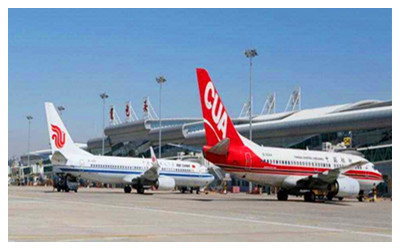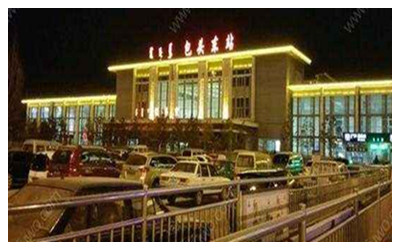Skype: neodalle-travel
Tel: +86 135 7447 2266
E-mail: sales@visitaroundchina.com
 Baotou Donghe Airport is located in Donghe District, about 2.7 kilometers southwest of the East Railway Station, 23 kilometers (about 14 miles) from the city center (Kundulun District). The airport was first built in 1934. In May, 2006, the airport conducted a restoration on the airfield and the project was inspected and the final acceptance checks were made in December, 2007. Former runway is expanded into 2,800 meters long and 60 meters (66 yards) wide. Parking apron has been enlarged into 58,000 square meters which can handle seven medium and large airplanes. This facility has become increasingly important as demonstrated by its designation as the alternate airport for the Beijing 2008 Olympics. The passenger terminal will put through about 300,000 passengers a year. The reconstruction of the airport greatly lifts the strain on the air transportation to or from the city. Currently, it has scheduled flights to Beijing, Shanghai, Taiyuan, Guangzhou and Hohhot every day and four flights a week (Monday, Tuesday, Thursday and Saturday) to Chengdu and Shenyang.
Baotou Donghe Airport is located in Donghe District, about 2.7 kilometers southwest of the East Railway Station, 23 kilometers (about 14 miles) from the city center (Kundulun District). The airport was first built in 1934. In May, 2006, the airport conducted a restoration on the airfield and the project was inspected and the final acceptance checks were made in December, 2007. Former runway is expanded into 2,800 meters long and 60 meters (66 yards) wide. Parking apron has been enlarged into 58,000 square meters which can handle seven medium and large airplanes. This facility has become increasingly important as demonstrated by its designation as the alternate airport for the Beijing 2008 Olympics. The passenger terminal will put through about 300,000 passengers a year. The reconstruction of the airport greatly lifts the strain on the air transportation to or from the city. Currently, it has scheduled flights to Beijing, Shanghai, Taiyuan, Guangzhou and Hohhot every day and four flights a week (Monday, Tuesday, Thursday and Saturday) to Chengdu and Shenyang.Parking lot of the passenger terminal building was completed in 1999, designed to have a capacity of 210 cars. As the passengers get increasing more, parking spaces are insufficient. At present, the parking lot is 2,480 square meters (2,966 square yards) larger than before and 100 parking spaces are added.
There are no shuttle or city bus lines between downtown and the airport. Taxis are the only means of public transportation to get into the city. Metered taxis charge CNY10 from the East Railway Station and CNY40 from the city center (Kundulun District) to go the airport. It is a good idea for passengers to agree upon a fare beforehand whether the cab is metered or not.
Tips: The CAAC (the Civil Aviation Administration of China) ticket office is located in Baotou Hotel, Kundulun District, about 23 kilometers from the airport.
 Baotou East Railway Station and Baotou Railway Station are the two main rail hubs in the city. Trains to many major cities can easily be found at either station. The former station is in Aerding Street of Kundulun District and can be reached by taking Bus nos. 1, 2, 8, 15, 22, 39, 41, 46, 50, 60, 64, and 100. It was the joint area of Beijing-Baotou Railway and Baotou-Lanzhou Railway. The latter station is the east railway station located at Donghe District and can be reached by taking Bus nos. 7, 10, 16, 17, 18, 30, 34, 49, 50, and 57. Trains to Xi'an, Changsha, Chengdu, Datong, Taiyuan, Guangzhou, Hangzhou, Jinan, Jiayuguan, Lanzhou, Nanjing, Ningbo, Qinhuangdao, Shanghai, Shijazhuang, Tianjin, Zhengzhou and many other cities are all available here. Passengers should make sure they are going to the correct station for their journey. The city's two railway stations are rather distant from each other, so going to the wrong one could cause a considerable waste of time.
Baotou East Railway Station and Baotou Railway Station are the two main rail hubs in the city. Trains to many major cities can easily be found at either station. The former station is in Aerding Street of Kundulun District and can be reached by taking Bus nos. 1, 2, 8, 15, 22, 39, 41, 46, 50, 60, 64, and 100. It was the joint area of Beijing-Baotou Railway and Baotou-Lanzhou Railway. The latter station is the east railway station located at Donghe District and can be reached by taking Bus nos. 7, 10, 16, 17, 18, 30, 34, 49, 50, and 57. Trains to Xi'an, Changsha, Chengdu, Datong, Taiyuan, Guangzhou, Hangzhou, Jinan, Jiayuguan, Lanzhou, Nanjing, Ningbo, Qinhuangdao, Shanghai, Shijazhuang, Tianjin, Zhengzhou and many other cities are all available here. Passengers should make sure they are going to the correct station for their journey. The city's two railway stations are rather distant from each other, so going to the wrong one could cause a considerable waste of time.By Highways
By City Bus
For intra-city transportation, Baotou has more than 6,000 taxis and some forty-eight bus lines that blanket the city and even service the suburbs. There are forty-eight city bus liens servicing the districts and suburbs of Baotou City. These are conductor less buses and the ticket price is usually CNY1. Some buses that run a longer distance (for example, Bus no. 35 between Kundulun and Hedong Districts) may charge CNY2. Usually signs are posted inside the buses designating the fares.
By Taxi
Shuttling in the city by taxi is quite convenient so that it is the option of many locals and visitors. However, it is said that only a small part of taxi drivers charge by meter.
 Ask Questions ?
Ask Questions ?